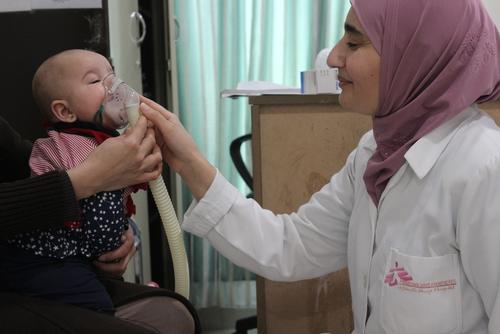Irbid – An upgrade to provide complicated deliveries including C-sections and improved neonatal care has been implemented at the MSF mother and child project in Irbid, northern Jordan. The upgrade also included a development in the mental health support program which is reaching out to Syrian mothers and children in refugee communities in the north of Jordan.
Although unofficial figures are much higher, as of 6 May the UNHCR has an active registered case-load in Jordan, of 627,287 Syrian refugees, of whom 163,156 (26%) have found refuge in Irbid, Jerash, Mafraq and Ajloun. Refugees from these areas have been coming to seek health care for themselves and their babies and children at the MSF hospital in Irbid. Since the project started in October 2013, it has provided over 20,991 obstetrics/gynaecology consultations, 18,082 paediatric consultations, 3089 deliveries and 389 neonatology admissions.
The project has become even more important due to the increased pressure on Jordan’s health system and following the Jordanian authorities’ announcement in November 2014 that all Syrian refugees, whether registered or not, would have to pay for health care at Ministry of Health facilities.
MSF has recently upgraded its medical activities in Irbid, adopting higher standards for maternity and neonatology. The project can now manage complicated deliveries and a surgical team has been put in place to provide Caesarean sections in an MSF operating theatre.
“MSF has had to upgrade its activities in Irbid due to the changing needs, both in terms of the numbers of refugees needing care, as well as the types of cases we have been receiving,” said Jean-Baptiste Marion, Project Coordinator for MSF in Irbid. “We have been seeing more complicated deliveries and complicated cases in need of neonatal care, and so we had to adapt to meet these needs, and this involved moving the project to a new hospital facility.”
Work is also under way to develop an intensive care unit for newborns, providing CPAP (continuous positive airway pressure) respiratory care, which uses mild air pressure to keep the airways open. This treatment will be provided to babies with breathing problems, such as sleep apnea, respiratory disorders and babies born with underdeveloped lungs.
The continuous evolution in the context has also forced Syrian refugees in Jordan to face more economic and social difficulties. In October 2014 a mental health support program for Syrian children was started, and now includes outreach activities to reach out to Syrian refugee communities in the north of Jordan.
Om Mahmoud, a Syrian refugee mother who brought her children to be treated at the MSF hospital said, “Although we are here in Jordan, which is a safe country, on quiet nights we can still sometimes hear the sounds of shelling and bombing in Dara’a which is near the Jordanian border. My children often recall all the horrific memories and panic.”
Marc Schakal, MSF’s Head of Mission in Jordan said: “More than half of the children followed by the MSF mental health team in Irbid have witnessed one or more distress factors – the killing of a loved one, the destruction of a home, physical or psychological abuse. The mothers of these children are also being supported by MSF as they struggle to look after their children, in most cases alone due to the death or absence of the father. We are offering them a range of services – individual therapy, group therapy, dyadic therapy, group support and parental guidance.
“Access to mother and child care, as well as mental health care, is very difficult for Syrian refugees here in Jordan, and we are trying to fill some of this gap which, but more needs to be done,” Schakal added.



